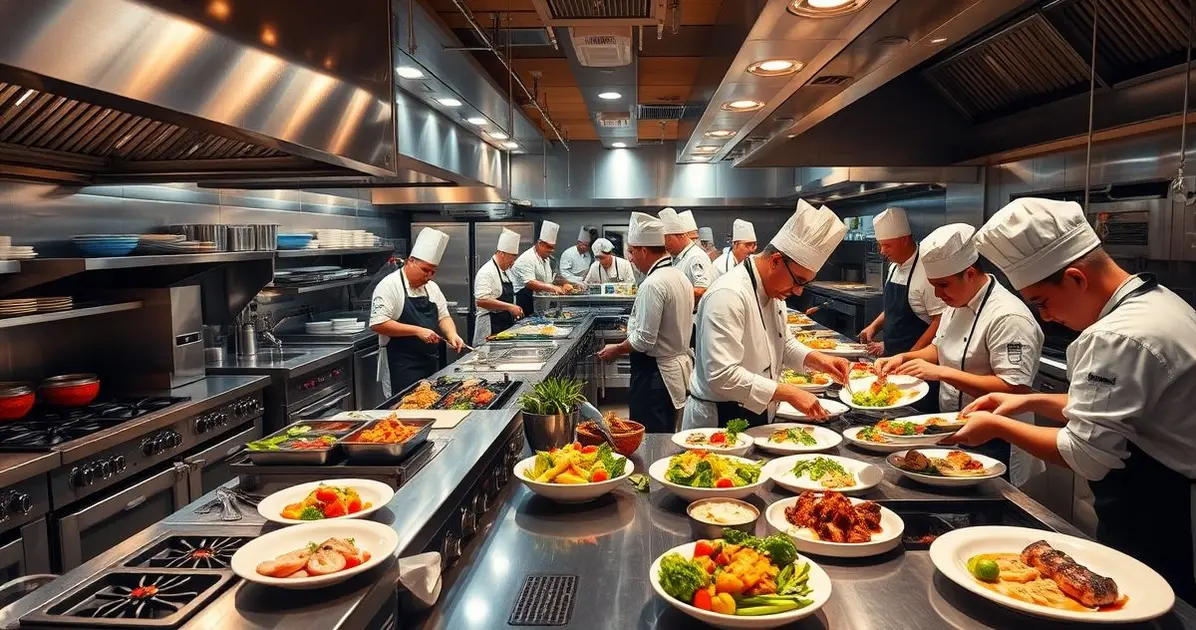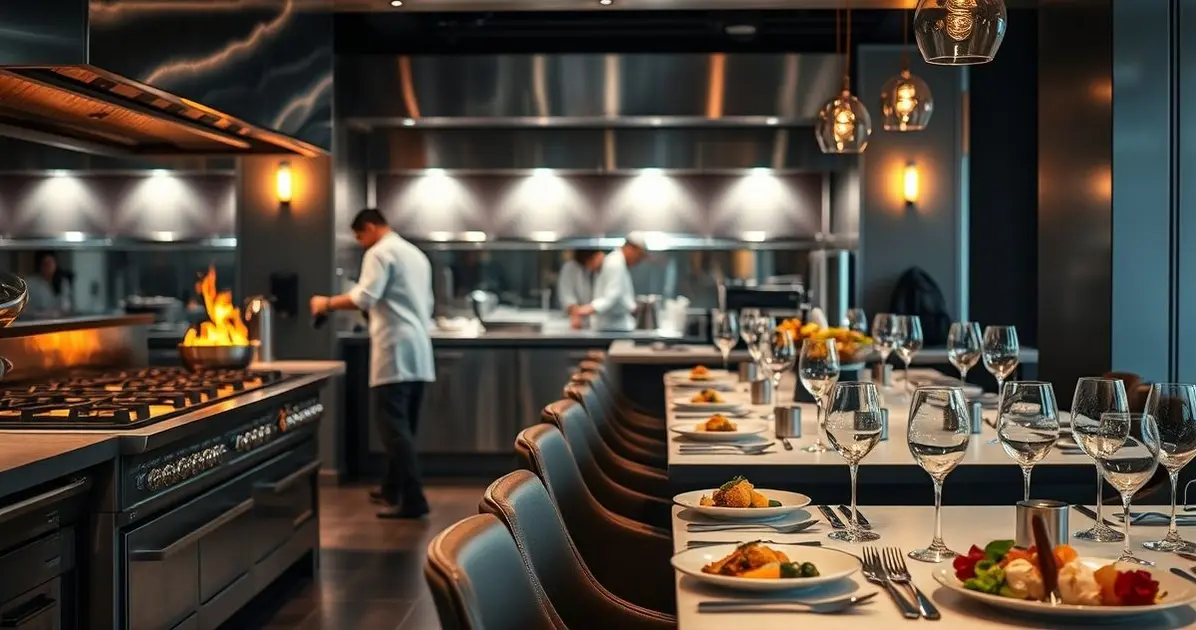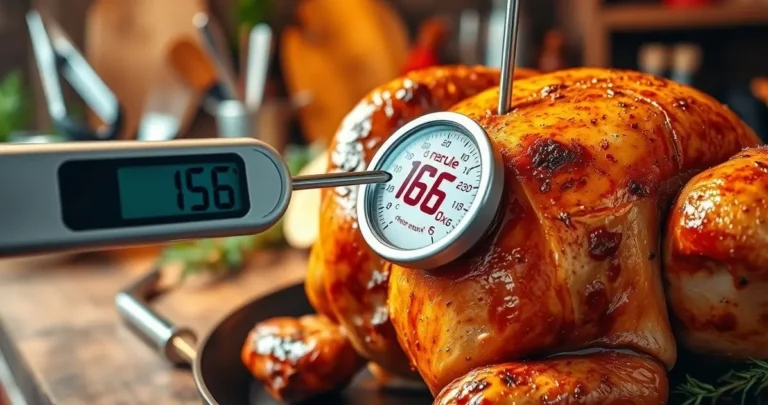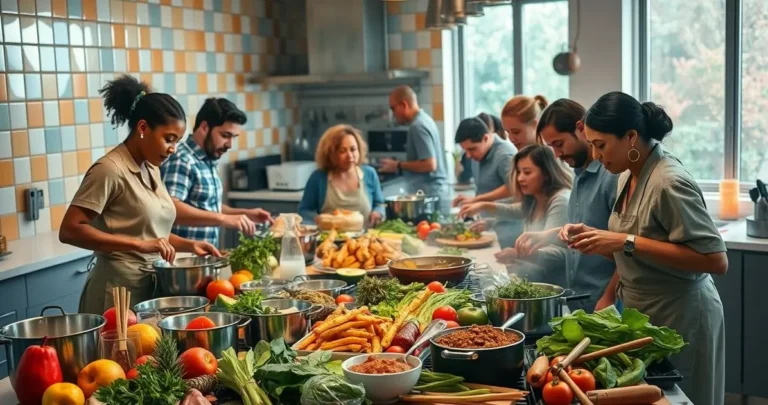Commercial cooking is the preparation of food in large quantities to be served in restaurants, catering services, or other food establishments. It requires professional skills and equipment to ensure quality and efficiency.
What is commercial cooking

Commercial cooking involves the art and science of preparing large-scale meals for events, restaurants, and institutional kitchens. It emphasizes professional techniques, safety standards, and the use of commercial-grade equipment in a fast-paced environment.
Understanding Commercial Cooking
Understanding commercial cooking is essential for anyone looking to thrive in the culinary industry. It’s not just about whipping up delicious meals; it’s about mastering a complex system that combines culinary skills with business acumen.
First and foremost, commercial cooking requires a solid grasp of culinary techniques. This includes everything from knife skills to cooking methods like roasting, grilling, and sautéing. Chefs must be able to execute these techniques flawlessly to ensure that every dish meets high standards of taste and presentation.
Moreover, menu development plays a significant role in commercial cooking. Chefs need to create menus that not only appeal to customers but also align with the restaurant’s concept and budget. This involves careful consideration of ingredient costs, preparation time, and seasonal availability.
Another vital aspect of commercial cooking is kitchen management. This entails overseeing kitchen operations, managing staff, and ensuring that everything runs smoothly during service hours. Effective communication and leadership skills are crucial for maintaining a harmonious work environment and ensuring that all team members are on the same page.
Lastly, food safety cannot be overlooked. Understanding food safety regulations and best practices is critical in a commercial kitchen. This includes proper food handling, storage, and sanitation practices to prevent contamination and ensure customer safety.
In summary, understanding commercial cooking means mastering a blend of culinary skills, menu planning, kitchen management, and food safety. By honing these skills, aspiring chefs can set themselves up for success in the fast-paced world of commercial kitchens.
Essential Skills for Success
Essential skills for success in commercial cooking go beyond just knowing how to cook. They encompass a range of abilities that help chefs thrive in a fast-paced kitchen environment.
Here are some key skills that every aspiring commercial cook should develop:
- Culinary Techniques: Mastering various cooking methods, from basic knife skills to advanced techniques, is fundamental. Chefs should be comfortable with grilling, baking, frying, and sautéing, among others.
- Time Management: In a commercial kitchen, timing is everything. Being able to prioritize tasks and manage time effectively ensures that meals are prepared and served promptly, which is crucial during busy service hours.
- Creativity: A successful chef must have a creative flair. This involves not only creating unique dishes but also innovating existing recipes and adapting to seasonal ingredients.
- Attention to Detail: Precision is key in commercial cooking. Whether it’s measuring ingredients accurately or plating dishes beautifully, attention to detail can make a significant difference in the final product.
- Teamwork and Communication: A commercial kitchen operates as a team. Strong communication skills and the ability to work collaboratively with others are essential for ensuring a smooth workflow and high-quality output.
- Problem-Solving: Challenges are bound to arise in any kitchen. Being able to think on your feet and come up with quick solutions is an invaluable skill that can help maintain efficiency and quality during service.
By honing these essential skills, aspiring chefs can build a strong foundation for a successful career in commercial cooking. Whether working in a bustling restaurant or a catering company, these abilities will serve them well in achieving culinary excellence.

Food Safety Regulations
Food safety regulations are critical in commercial cooking, as they ensure that the food prepared and served is safe for consumption.
Understanding and adhering to these regulations is not only a legal requirement but also a fundamental responsibility of any culinary professional.
Here are some key aspects of food safety regulations that every commercial cook should be familiar with:
- Hygiene Practices: Maintaining personal hygiene is the first step in food safety. This includes regular handwashing, wearing clean uniforms, and using gloves when handling food. Chefs must also ensure that their workstations and cooking equipment are kept clean and sanitized.
- Temperature Control: Proper temperature control is essential to prevent foodborne illnesses. This involves cooking foods to the right internal temperatures, keeping hot foods hot, and cold foods cold. Understanding the danger zone (between 40°F and 140°F) is crucial for food safety.
- Cross-Contamination Prevention: Cross-contamination occurs when harmful bacteria are transferred from one food item to another. To prevent this, cooks should use separate cutting boards for raw meats and vegetables, and store food items appropriately in the refrigerator.
- Food Storage Regulations: Knowing how to store food safely is vital. This includes understanding proper food labeling, expiration dates, and the correct way to store leftovers to minimize waste and maintain quality.
- Allergen Management: With the rise of food allergies, it’s important for chefs to be aware of common allergens and how to prevent cross-contact. This includes being transparent about ingredients and accommodating guests with food allergies.
- Local Health Codes: Each locality has its own health codes and regulations that govern food safety practices. Chefs should familiarize themselves with these codes to ensure compliance and avoid penalties.
By prioritizing food safety regulations, commercial cooks not only protect their customers but also enhance their reputation and the overall success of their establishment.
A commitment to food safety is a hallmark of professionalism in the culinary industry.
The Economics of Food Production
The economics of food production is a vital aspect of commercial cooking that involves understanding the financial implications of running a food business. It encompasses various elements that influence profitability and operational efficiency.
Here are some key components to consider:
- Cost Management: One of the most significant factors in food production is managing costs. This includes ingredient costs, labor expenses, and overhead such as rent and utilities. Chefs and restaurant owners must track these expenses closely to maintain profitability.
- Menu Pricing: Setting the right prices for menu items is crucial. Pricing should reflect the cost of ingredients and preparation while also considering market demand and competition. A well-priced menu can attract customers and ensure a healthy profit margin.
- Supply Chain Management: Effective supply chain management is essential for ensuring that quality ingredients are available when needed. Building strong relationships with suppliers can lead to better prices and reliable delivery, which is crucial for maintaining quality and consistency.
- Waste Reduction: Minimizing food waste is not only environmentally friendly but also economically beneficial. Chefs can implement strategies such as portion control, creative use of leftovers, and proper storage techniques to reduce waste and improve profitability.
- Labor Efficiency: Labor costs can significantly impact a restaurant’s bottom line. Streamlining kitchen operations and training staff effectively can enhance productivity and reduce labor expenses. Efficient workflows and clear communication among team members are key to achieving this.
- Market Trends: Understanding market trends can help chefs adapt their offerings to meet customer preferences. Staying informed about food trends, dietary restrictions, and seasonal ingredients can drive sales and attract new customers.
By grasping the economics of food production, chefs can make informed decisions that enhance their business’s success. A solid understanding of these principles allows culinary professionals to balance creativity with financial viability, ensuring long-term sustainability in the competitive food industry.
Conclusion
In the dynamic world of commercial cooking, success hinges on a blend of culinary expertise, effective management, and a strong understanding of food safety and economics. Mastering essential skills such as culinary techniques, time management, and teamwork lays the groundwork for a thriving career.
Meanwhile, adhering to food safety regulations ensures not only compliance but also the health and satisfaction of customers.
Furthermore, comprehending the economics of food production is crucial for maintaining profitability and operational efficiency. By managing costs, pricing menu items appropriately, and minimizing waste, chefs can create a sustainable business model that thrives in a competitive landscape.
Ultimately, commercial cooking is both an art and a science, requiring passion, creativity, and a commitment to excellence. By embracing these principles, culinary professionals can achieve mastery in their craft and contribute to the vibrant world of food service.
FAQ – Frequently Asked Questions about Commercial Cooking
What is commercial cooking?
Commercial cooking involves preparing food on a large scale for businesses like restaurants and catering services.
What skills are essential for success in commercial cooking?
Essential skills include culinary techniques, time management, creativity, attention to detail, teamwork, and problem-solving.
Why is food safety important in commercial cooking?
Food safety is crucial to prevent foodborne illnesses and ensure customer health, requiring adherence to strict hygiene and handling practices.
How can I manage costs in a commercial kitchen?
Cost management involves tracking ingredient prices, labor expenses, and overhead, along with efficient supply chain and waste reduction strategies.
What role does menu pricing play in commercial cooking?
Menu pricing is vital for profitability, reflecting ingredient costs and market demand while attracting customers.
How can I reduce food waste in a commercial kitchen?
Implementing portion control, utilizing leftovers creatively, and ensuring proper storage techniques can significantly minimize food waste.
See more
Discover plenty of easy and delicious recipes you can make at home, from hearty dinners to indulgent desserts and wholesome breakfasts.




